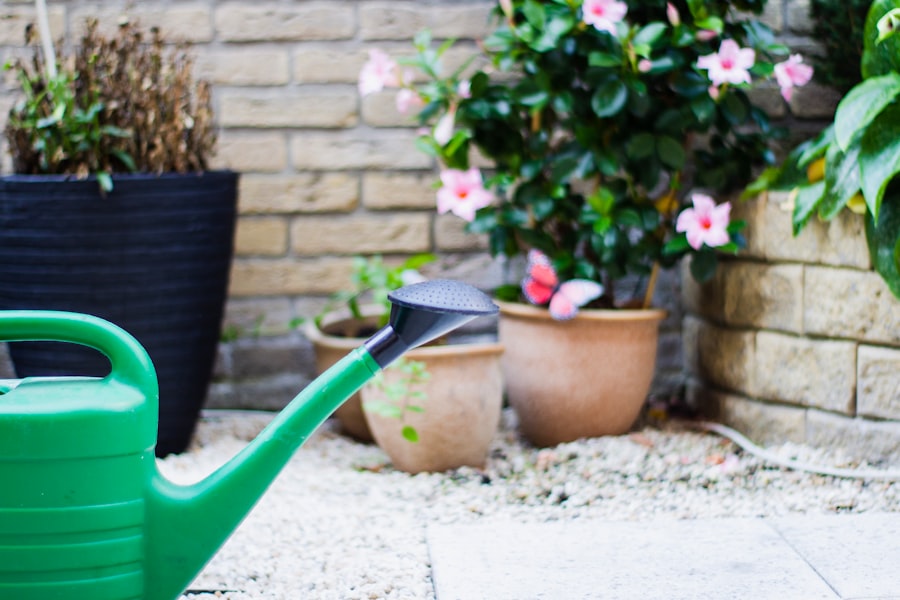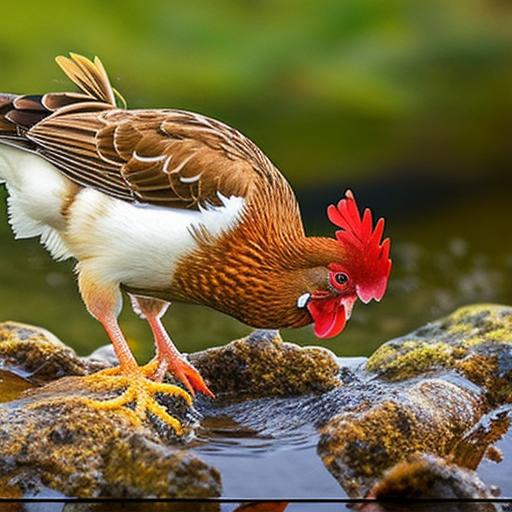Fresh water is essential for the health and well-being of chickens. Just like humans, chickens need access to clean and fresh water in order to stay hydrated and maintain their overall health. As a chicken owner, it is important to choose the right watering system for your chicken coop to ensure that your flock has a constant supply of clean water. In this article, we will discuss the importance of fresh water for chickens, factors to consider when choosing a watering system, and the different types of watering systems available for chicken coops.
Key Takeaways
- Fresh water is crucial for the health and well-being of chickens.
- When choosing a watering system for your chicken coop, consider factors such as cost, ease of use, and maintenance requirements.
- Gravity-fed waterers are a simple and affordable option, but may not be suitable for larger flocks.
- Nipple waterers and cup waterers are more expensive but offer greater control over water flow and can help prevent contamination.
- Automatic waterers are the most convenient option, but require a higher upfront investment and regular maintenance to ensure proper function.
Importance of Fresh Water for Chickens
Fresh water is crucial for the health and productivity of chickens. Chickens need water to regulate their body temperature, aid in digestion, and transport nutrients throughout their bodies. Without access to clean and fresh water, chickens can become dehydrated, which can lead to a variety of health issues such as decreased egg production, poor growth, and even death.
In addition to hydration, fresh water also plays a role in egg production. Water is necessary for the formation of eggs, and a lack of water can result in smaller or misshapen eggs. Providing your chickens with clean and fresh water will not only keep them healthy but also ensure that they are able to produce high-quality eggs.
Factors to Consider when Choosing Watering System
When choosing a watering system for your chicken coop, there are several factors that you should consider. The number of chickens you have will determine the size and capacity of the watering system you need. If you have a large flock, you may need a system that can hold more water or multiple watering stations to ensure that all of your chickens have access to water.
The climate in which you live is another important factor to consider. In hot climates, chickens may require more water to stay hydrated and cool down. In cold climates, you may need a system that prevents the water from freezing during the winter months. It is important to choose a watering system that is suitable for the climate in your area.
Budget is also an important consideration when choosing a watering system. There are a wide range of options available, from simple and inexpensive gravity-fed waterers to more advanced and costly automatic waterers. It is important to choose a system that fits within your budget while still meeting the needs of your flock.
Types of Watering Systems for Chicken Coops
There are several types of watering systems available for chicken coops, each with its own advantages and disadvantages. The most common types of watering systems include gravity-fed waterers, nipple waterers, cup waterers, and automatic waterers.
Gravity-fed waterers are one of the simplest and most affordable options. They consist of a container that holds the water and a tray or trough that the chickens can drink from. The water flows down into the tray or trough due to gravity. Gravity-fed waterers are easy to set up and maintain, but they may not be suitable for larger flocks as they may need to be refilled frequently.
Nipple waterers are another popular option. They consist of a series of small nipples that release water when the chickens peck at them. Nipple waterers are more hygienic than other types of waterers as they prevent the chickens from contaminating the water with dirt or droppings. However, they can be more expensive and require more maintenance as the nipples need to be cleaned regularly.
Cup waterers are similar to nipple waterers but use small cups instead of nipples. The cups fill with water when the chickens peck at them, providing a constant supply of fresh water. Cup waterers are easy to install and maintain, but they may not be suitable for larger flocks as they may need to be refilled frequently.
Automatic waterers are the most advanced and convenient option. They consist of a system that automatically refills the water as the chickens drink from it. Automatic waterers can be connected to a water source, such as a hose or a water line, and can provide a constant supply of fresh water without the need for frequent refilling. However, they can be more expensive and may require more maintenance.
Gravity-Fed Waterers
Gravity-fed waterers are one of the simplest and most affordable options for providing water to your chickens. They work by using gravity to allow the water to flow down into a tray or trough that the chickens can drink from. Gravity-fed waterers are easy to set up and maintain, making them a popular choice for backyard chicken owners.
One of the advantages of gravity-fed waterers is that they do not require any additional equipment or power source. They simply rely on gravity to provide a constant supply of fresh water to your chickens. This makes them a cost-effective option for those on a budget.
However, gravity-fed waterers may not be suitable for larger flocks as they may need to be refilled frequently. The capacity of the water container will determine how often it needs to be refilled. If you have a large flock, you may need multiple gravity-fed waterers or a larger capacity container to ensure that all of your chickens have access to water.
Nipple Waterers

Nipple waterers are another popular option for providing fresh water to chickens. They consist of a series of small nipples that release water when the chickens peck at them. Nipple waterers are more hygienic than other types of waterers as they prevent the chickens from contaminating the water with dirt or droppings.
One of the advantages of nipple waterers is that they provide a constant supply of fresh water to your chickens. The nipples only release water when the chickens peck at them, which helps to prevent wastage and keeps the water clean. Nipple waterers are also easy to install and maintain, making them a convenient option for chicken owners.
However, nipple waterers can be more expensive than other types of waterers. The cost of the nipples and the additional equipment needed to set up the system can add up. Nipple waterers also require more maintenance as the nipples need to be cleaned regularly to prevent clogging.
Cup Waterers
Cup waterers are similar to nipple waterers but use small cups instead of nipples. The cups fill with water when the chickens peck at them, providing a constant supply of fresh water. Cup waterers are easy to install and maintain, making them a popular choice for backyard chicken owners.
One of the advantages of cup waterers is that they provide a constant supply of fresh water to your chickens. The cups fill with water as the chickens drink from them, which helps to prevent wastage and keeps the water clean. Cup waterers are also easy to install and maintain, making them a convenient option for chicken owners.
However, cup waterers may not be suitable for larger flocks as they may need to be refilled frequently. The capacity of the cups will determine how often they need to be refilled. If you have a large flock, you may need multiple cup waterers or a larger capacity system to ensure that all of your chickens have access to water.
Automatic Waterers
Automatic waterers are the most advanced and convenient option for providing fresh water to chickens. They consist of a system that automatically refills the water as the chickens drink from it. Automatic waterers can be connected to a water source, such as a hose or a water line, and can provide a constant supply of fresh water without the need for frequent refilling.
One of the advantages of automatic waterers is that they provide a constant supply of fresh water to your chickens without the need for frequent refilling. The system automatically refills the water as the chickens drink from it, ensuring that they always have access to clean water. Automatic waterers are also easy to install and can be connected to a water source, such as a hose or a water line.
However, automatic waterers can be more expensive than other types of waterers. The cost of the system and the additional equipment needed to set it up can add up. Automatic waterers also require more maintenance as the system needs to be checked regularly for any leaks or malfunctions.
Tips for Maintaining Clean Water in Chicken Coops
Maintaining clean water in your chicken coop is essential for the health and well-being of your flock. Here are some tips to help you keep the water in your chicken coop clean:
1. Clean the waterer regularly: It is important to clean the waterer regularly to prevent the buildup of bacteria and algae. Empty the waterer, scrub it with a brush, and rinse it thoroughly before refilling it with fresh water.
2. Use additives: Adding a small amount of apple cider vinegar or hydrogen peroxide to the water can help prevent the growth of bacteria and algae. These additives are safe for chickens and can help keep the water clean.
3. Provide shade: If your chicken coop is located in an area that receives direct sunlight, it is important to provide shade for the waterer. Direct sunlight can cause the water to become warm and promote the growth of bacteria.
4. Prevent contamination: Place the waterer in an area that is away from feeders and bedding to prevent contamination from droppings or dirt. Elevating the waterer off the ground can also help prevent contamination.
5. Check for leaks: Regularly check the waterer for any leaks or malfunctions. Leaks can not only waste water but also create wet areas in the coop that can attract pests and promote bacterial growth.
Choosing the Best Watering System for Your Chicken Coop
Choosing the right watering system for your chicken coop is essential for the health and productivity of your flock. Consider factors such as the number of chickens, climate, and budget when choosing a watering system. There are several types of watering systems available, including gravity-fed waterers, nipple waterers, cup waterers, and automatic waterers. Each type has its own advantages and disadvantages, so it is important to choose a system that meets the needs of your flock.
Remember to maintain clean water in your chicken coop by regularly cleaning the waterer, using additives to prevent bacteria and algae growth, providing shade, preventing contamination, and checking for leaks. By providing your chickens with clean and fresh water, you can ensure that they stay hydrated and healthy.
If you’re looking for the best way to keep fresh water for chickens, you might also be interested in learning about the importance of providing proper nutrition for your poultry. Poultry Wizard has a helpful article on whether geese can eat chicken feed, which explores the nutritional needs of geese and how it relates to their diet. Understanding the dietary requirements of different poultry species can help ensure their overall health and well-being. Check out the article here to learn more about feeding geese and how it can impact their overall health.
FAQs
What is the best way to keep fresh water for chickens?
The best way to keep fresh water for chickens is to provide them with clean water in a clean container that is free from contaminants.
How often should I change the water for my chickens?
You should change the water for your chickens at least once a day, or more frequently if the water becomes dirty or contaminated.
What type of container should I use to provide water for my chickens?
You should use a container that is specifically designed for providing water to chickens, such as a waterer or a nipple drinker. These containers are designed to keep the water clean and prevent contamination.
How much water should I provide for my chickens?
You should provide enough water for your chickens to drink throughout the day. A good rule of thumb is to provide at least one gallon of water for every 10 chickens.
What should I do if my chickens are not drinking enough water?
If your chickens are not drinking enough water, you should check to make sure that the water is clean and free from contaminants. You may also want to try adding some electrolytes to the water to encourage your chickens to drink more.
Can I add supplements or medications to the water for my chickens?
Yes, you can add supplements or medications to the water for your chickens, but you should always follow the instructions carefully and make sure that the water remains clean and free from contaminants.
Meet Walter, the feathered-friend fanatic of Florida! Nestled in the sunshine state, Walter struts through life with his feathered companions, clucking his way to happiness. With a coop that’s fancier than a five-star hotel, he’s the Don Juan of the chicken world. When he’s not teaching his hens to do the cha-cha, you’ll find him in a heated debate with his prized rooster, Sir Clucks-a-Lot. Walter’s poultry passion is no yolk; he’s the sunny-side-up guy you never knew you needed in your flock of friends!







